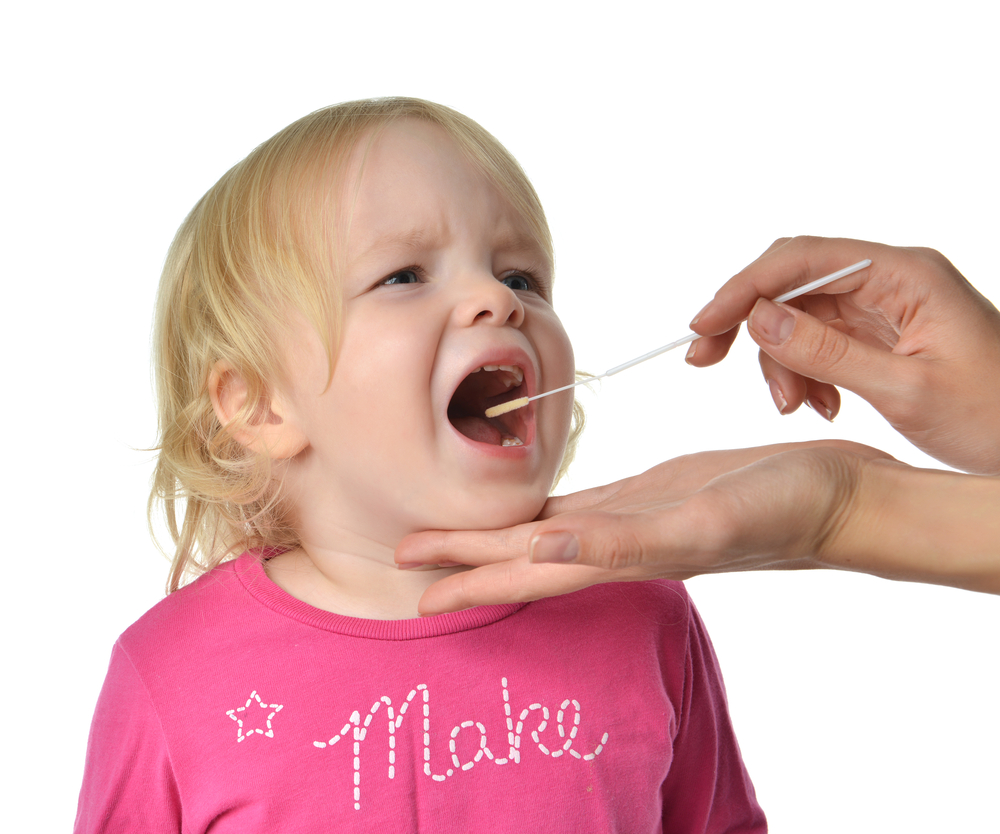What is Strep?
Strep (Group A streptococcus) is a type of bacteria (germ) that can cause many illnesses. The most common illness is also called “strep throat” or tonsillitis. Strep throat is different from other sore throats; there can be serious complications if left untreated.
What is the difference between a sore throat and strep throat?
|
Sore Throat |
Strep Throat |
|---|---|
|
|
Complications of strep throat can include:
- Ear infections
- Sinus infections
- Abscesses (pockets of pus) in the tonsils
- Lung, blood, or skin infections
- Scarlet fever – Strep throat with a rash on the body
- Rheumatic fever – Pain and swelling in joints, may cause heart damage
How do you get strep throat?
Strep bacteria are spread from one person to another when the germ gets into the mouth, nose or eyes. This can happen when coughing, sneezing, kissing or spending a lot of time near someone with strep throat.
What should I do if I think my child has strep throat?
If you suspect your child has strep throat:
- Take them to their health-care provider, a walk-in/same day clinic, nursing station or health centre
- If you do not have a health-care provider, Family Doctor Finder can help.
How is strep throat diagnosed?
To diagnose strep throat, your health-care provider will take a swab of your child’s throat and test it.
How is strep throat treated?
- Your health-care provider will prescribe antibiotics.
- Your child should take all the medication, even if they seem better.
Why is it important to treat strep throat?
Your child will get better faster. Symptoms will usually get better within one to three days after starting treatment. Treatment can prevent spreading strep throat to friends and family and can prevent serious complications.
Tips for comforting your child (for a sore throat or strep throat):
- Keep your child hydrated by offering plenty of fluids or breastfeeding/chestfeeding on cue.
- Gargle with warm salt water
- Let your child rest
- If your child has a fever, dress them in light clothing and remove any extra blankets.
- Acetaminophen (Tylenol®, Tempra®) or ibuprofen (Advil®, Motrin®) are the medicines that can be used to reduce your child’s aches and pains from the fever and illness.
- How much you give is based on your child’s age and weight.
- Follow the medicine’s directions for how much and how often you can give the medicine to your child.
Safety Tips
To avoid giving your child too much medication:
- Use only the measuring syringe or cup that comes with the medicine. Kitchen spoons are not all the same and can cause overdosing.
- Make a note of the time and amount you gave. Tip: your calendar or phone works great for this.
- Write clear instructions for other caregivers about your child’s medicine – what medicine, how much and when.
To keep your kids safe
Put all medicine away after every use, even if you are going to be using it again soon. Store it out of sight and out of reach of children.
Choose the right medication for your child:
- Do not give acetylsalicylic acid (ASA, Aspirin®) to children because it can cause a rare and dangerous disease called Reye’s Syndrome.
- Do not give ibuprofen if your child is dehydrated, vomiting or has diarrhea because it can harm the kidneys.
- Do not give over-the-counter cough and cold medicines to children under six.
- Check with your pharmacist if your child is taking two or more medications to make sure it’s safe.
Do I need to keep my child home?
- If your child has strep throat, they are contagious. Keep them at home from daycare or school until they have taken the antibiotic for at least one full day.
- Keep your child home if they are still feeling sick after one day of treatment and cannot participate.
How to prevent the spread of strep throat
- Wash your and your child’s hands with soap and water after coughing, sneezing or wiping a runny nose. To learn more see Hand Hygiene – Government of Manitoba
- Sing your child’s favourite song with them while washing hands to make sure they is washing long enough.
- Cough and sneeze into the inside of your elbow or into a tissue instead of your hands. To learn more see: Cover your Cough and Sneeze – Government of Manitoba.
Do you still have questions?
Call Health Links – Info Santé (204-788-8200, toll-free 1-888-315-9257). You can speak to a nurse 24/7, 365 days of the year in over 100 languages to answer any of your health questions and to help you find services in your community.
References:
- Strep Throat – Caring for Kids
- Sore throat vs strep throat - Winnipeg Regional Health Authority
- Group A Streptococcal Infection– Centers for Disease Control
- Sore Throat Basics – Centers for Disease Control
- Treatment and prevention of streptococcal pharyngitis in adults and children – UpToDate


